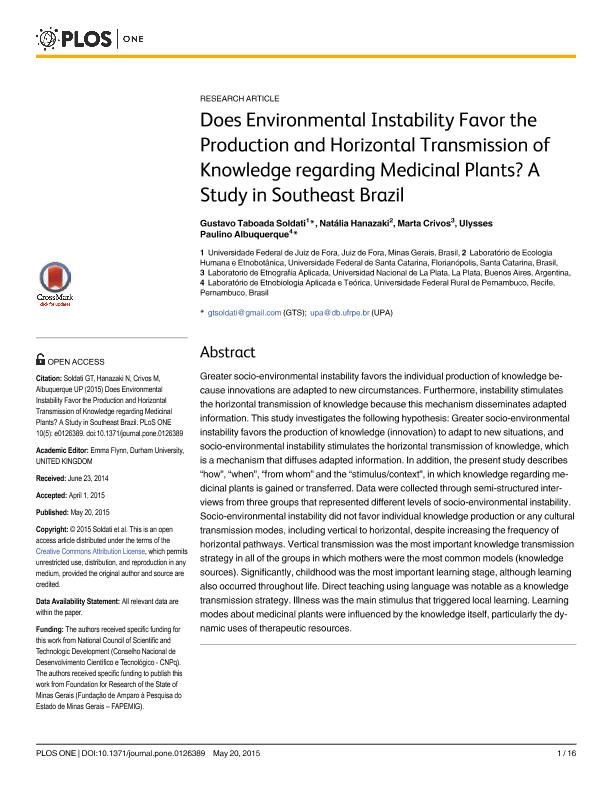Mostrar el registro sencillo del ítem
dc.contributor.author
Taboada Soldati, Gustavo
dc.contributor.author
Hanazaki, Natalia
dc.contributor.author
Crivos, Marta Alicia

dc.contributor.author
Albuquerque, Ulysses Paulino
dc.date.available
2017-03-08T20:25:02Z
dc.date.issued
2015-05
dc.identifier.citation
Taboada Soldati, Gustavo; Hanazaki, Natalia; Crivos, Marta Alicia; Albuquerque, Ulysses Paulino; Does environmental instability favor the production and horizontal transmission of knowledge regarding medicinal plants?: a study in southeast Brazil; Public Library Of Science; Plos One; 10; 5; 5-2015; 1-16; e0126389
dc.identifier.uri
http://hdl.handle.net/11336/13656
dc.description.abstract
Greater socio-environmental instability favors the individual production of knowledge because innovations are adapted to new circumstances. Furthermore, instability stimulates the horizontal transmission of knowledge because this mechanism disseminates adapted information. This study investigates the following hypothesis: Greater socio-environmental instability favors the production of knowledge (innovation) to adapt to new situations, and socio-environmental instability stimulates the horizontal transmission of knowledge, which is a mechanism that diffuses adapted information. In addition, the present study describes “how”, “when”, “from whom” and the “stimulus/context”, in which knowledge regarding medicinal plants is gained or transferred. Data were collected through semi-structured interviews from three groups that represented different levels of socio-environmental instability. Socio-environmental instability did not favor individual knowledge production or any cultural transmission modes, including vertical to horizontal, despite increasing the frequency of horizontal pathways. Vertical transmission was the most important knowledge transmission strategy in all of the groups in which mothers were the most common models (knowledge sources). Significantly, childhood was the most important learning stage, although learning also occurred throughout life. Direct teaching using language was notable as a knowledge transmission strategy. Illness was the main stimulus that triggered local learning. Learning modes about medicinal plants were influenced by the knowledge itself, particularly the dynamic uses of therapeutic resources.
dc.format
application/pdf
dc.language.iso
eng
dc.publisher
Public Library Of Science

dc.rights
info:eu-repo/semantics/openAccess
dc.rights.uri
https://creativecommons.org/licenses/by-nc-sa/2.5/ar/
dc.subject
Transmission of Knowledge
dc.subject
Socio-Environmental Instability
dc.subject.classification
Otras Ciencias Naturales y Exactas

dc.subject.classification
Otras Ciencias Naturales y Exactas

dc.subject.classification
CIENCIAS NATURALES Y EXACTAS

dc.title
Does environmental instability favor the production and horizontal transmission of knowledge regarding medicinal plants?: a study in southeast Brazil
dc.type
info:eu-repo/semantics/article
dc.type
info:ar-repo/semantics/artículo
dc.type
info:eu-repo/semantics/publishedVersion
dc.date.updated
2017-03-08T15:39:33Z
dc.identifier.eissn
1932-6203
dc.journal.volume
10
dc.journal.number
5
dc.journal.pagination
1-16; e0126389
dc.journal.pais
Estados Unidos

dc.journal.ciudad
San Francisco
dc.description.fil
Fil: Taboada Soldati, Gustavo. Universidade Federal de Juiz de Fora; Brasil
dc.description.fil
Fil: Hanazaki, Natalia. Universidade Federal Da Santa Catarina; Brasil
dc.description.fil
Fil: Crivos, Marta Alicia. Universidad Nacional de la Plata. Facultad de Cs.naturales y Museo. Laboratorio de Invest. En Etnografia Aplicada; Argentina. Consejo Nacional de Investigaciones Científicas y Técnicas; Argentina
dc.description.fil
Fil: Albuquerque, Ulysses Paulino. Universidade Federal Rural Pernambuco; Brasil
dc.journal.title
Plos One

dc.relation.alternativeid
info:eu-repo/semantics/altIdentifier/doi/http://dx.doi.org/10.1371/journal.pone.0126389
dc.relation.alternativeid
info:eu-repo/semantics/altIdentifier/url/http://journals.plos.org/plosone/article?id=10.1371/journal.pone.0126389
dc.relation.alternativeid
info:eu-repo/semantics/altIdentifier/url/https://www.ncbi.nlm.nih.gov/pmc/articles/PMC4439025/
Archivos asociados
